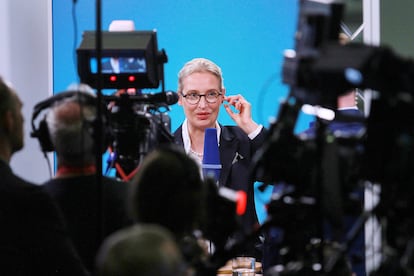Femonationalism in Europe: How the far right disguises xenophobia as freedom
The strategy of instrumentalizing the fight for women’s equality to promote xenophobic policies is spreading in countries such as France, Italy, the Netherlands, and Spain

Cologne, Germany. New Year’s Eve 2015. Several dozen women are sexually assaulted, robbed and intimidated by a crowd of men of Arab and North African origin. Investigations reveal that among the accused are several refugees who entered the country through Angela Merkel’s open-door policy. The episode caused a wave of anger and forced the government to tighten its asylum rules, an action on which extreme right-wing parties across Europe capitalized to justify their rejection of immigrants, who had become the scapegoats of sexism and violence against women on the continent.
A decade later, the consequences of that event are still reverberating in European politics. Now that extremist formations are gaining more support and, therefore, more power (they already make up six governments in the EU), the strategy of instrumentalizing feminism to promote their xenophobic policies is already spreading in countries such as France, Italy, the Netherlands, and Spain. This phenomenon is known as femonationalism, a term developed by Italian sociologist Sara R. Farris in the book In the Name of Women’s Rights: The Rise of Femonationalism (2017). The concept has since evolved, Farris explains, as far-right parties are “getting smarter and smarter.”
“[The far-right] understands very well that women’s empowerment is an issue that is there to stay and that there is no turning back from this battle. And by accepting this, they are trying to present themselves as more modern and moderate parties that defend our rights,” said the professor at Goldsmiths, University of London, via video call.
There are many examples. In Spain, Vox says it will not be “complicit in the robberies, the machete attacks, or the rapes” that the distribution of unaccompanied minors arriving in the Canary Islands would, in the formation’s view, entail. In Italy, Giorgia Meloni came to power in 2022 with a campaign focused on the rejection of immigrants, during which she shared a video of the rape of a woman by an asylum seeker. In Germany, the Alternative for Germany (AfD) spread the Great Replacement theory and proposed encouraging higher birth rates among German women.
If you look at how often they talk about gender issues, it is always to promulgate their anti-immigration and anti-Islam policy”Sara R. Farris, Italian sociologist
The rise of these discourses peaked in July, when the National Rally (RN) dreamed of forming a government in France. Marine Le Pen, the leader of the RN since 2011, has pushed for a profound renewal since she succeeded her father, Jean-Marie, who was expelled from the party after making denialist statements about the Holocaust. The rebranding involves presenting herself as a “feminist who is not hostile to men” and who supports abortion as a constitutional right. The numbers backed up her approach: the RN won the European elections by a large margin. However, a cordon sanitaire in extremis from the left and the center relegated the RN to third place in the July legislative elections.
For Farris, figures like Le Pen “have an opportunistic and completely instrumental approach to feminist ideals.” “If you look at how often they talk about gender issues, it is always to promulgate their anti-immigration and anti-Islam policy.” The sociologist stresses that femonationalism cannot be understood without the far right’s rejection of Islam. In the Netherlands, for example, the ultra-right-wing Geert Wilders won the elections last November with initiatives ranging from closing mosques and Islamic schools to banning the printing and distribution of the Quran. Meanwhile, Le Pen went so far as to speak of the “Talibanization” of France, in the face of a case of street violence.
French sociologist Charlène Calderaro states that, despite these formations boasting of defending women, the latter end up among the main victims. In France, laïcité — the religious neutrality of the state — can be translated into restrictions for Muslim women, according to this expert: “The argument is used that measures such as the banning of the full-face veil are taken in their defense and against supposedly sexist religions. [Leaders] say they want to emancipate them, but the effect is the exclusion of Muslim women from different spheres, such as school and work.”
But these cases are not limited to religion. Recently, the Italian ultra-right wing took advantage of the controversy over the Olympic Games boxing match between Angela Carini and Imane Khelif to amplify its discourse. Meloni demanded a “fair competition,” while the deputy prime minister, Matteo Salvini, fed the hoax that the Algerian Khelif was a trans boxer and that competing against “a woman [the Italian Carini]” was “unacceptable madness.” For Calderaro, as she adds by phone, it is fallacious to qualify extremist parties as “liberators” of women.
A female face
The popularity of these formations is accompanied by a renewal of image, often putting a woman at the forefront. The National Rally did so with Le Pen; Brothers of Italy, with Meloni, and AfD with Alice Weidel. Italian historian Steven Forti points out by telephone that these figures portray themselves as a parallel option to “a feminism that they themselves consider radical or extreme,” that is, progressive or left-wing.
The case of Weidel, co-leader of AfD, is quite illustrative: she is an openly gay woman, with two adopted children, who has taken the party from being a complete pariah to placing second in voting intentions in the European elections, above the three governing parties (Social Democrats, Liberals and Greens). Weidl’s profile, however, “does not imply that AfD’s policies on gender, the LGBTQI community, or migrants are any softer,” adds Forti, author of Far Right 2.0. What it is and how to fight it (2021).
The clean face of the far-right seems to be just a mirage or a political strategy. AfD has still not rid itself of its Nazi past: its head of the list for the European elections was expelled for making apologist statements about the SS and in Germany there is a strict cordon sanitaire around him. Another example is that of Meloni, who, according to Forti, “presents herself as a moderate conservative and very pragmatic in international politics,” but has not managed to curb the radical attitudes of members of her party. In addition, her government has pushed an ultra-conservative agenda with respect to abortion and the traditional family.
Vox, for its part, “is a bit more backward,” Forti stresses. Although anti-immigration discourse has been a pillar of its program for years, Santiago Abascal’s far-right party has not managed to gain the support of women in Spain in the same way that Le Pen or Meloni have. Abascal has broken government pacts with the conservative Popular Party over the distribution of migrant minors, whom he blamed for being responsible for “machete attacks” and “rapes,” an idea that echoes the Cologne attacks in 2015 and that still resonates in Europe.
Sign up for our weekly newsletter to get more English-language news coverage from EL PAÍS USA Edition
Tu suscripción se está usando en otro dispositivo
¿Quieres añadir otro usuario a tu suscripción?
Si continúas leyendo en este dispositivo, no se podrá leer en el otro.
FlechaTu suscripción se está usando en otro dispositivo y solo puedes acceder a EL PAÍS desde un dispositivo a la vez.
Si quieres compartir tu cuenta, cambia tu suscripción a la modalidad Premium, así podrás añadir otro usuario. Cada uno accederá con su propia cuenta de email, lo que os permitirá personalizar vuestra experiencia en EL PAÍS.
¿Tienes una suscripción de empresa? Accede aquí para contratar más cuentas.
En el caso de no saber quién está usando tu cuenta, te recomendamos cambiar tu contraseña aquí.
Si decides continuar compartiendo tu cuenta, este mensaje se mostrará en tu dispositivo y en el de la otra persona que está usando tu cuenta de forma indefinida, afectando a tu experiencia de lectura. Puedes consultar aquí los términos y condiciones de la suscripción digital.









































